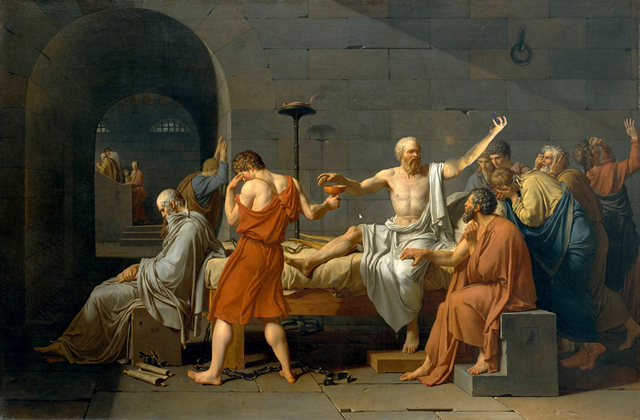Ancient philosophy. Life and creativity of Socrates. /part 9/
Such harmony and correspondence between spiritual and physical, between non-material consciousness and matter is a fact inexplicable by virtue of blind chance or mechanical action. Such consent necessarily implies a reasonable cause, a single mind that produces consciousness and, together, creates the external nature. Further, Socrates tells of the instinct of self-preservation, of the universal thirst for life, of the sexual and parental instincts, which, as well as everything organic, can also not be the elemental result of accidental coincidence of mechanical actions.
Prophecy, nutrition, sensuousness, consciousness, reason, and knowledge are all processes that are inexplicably mechanical, in which we find such a complex and expedient reconciliation and, together with this, a common, legitimate synergy.Finally, Socrates refers to the whole structure of Heaven and Earth, to the order and beauty of the universe, governed by unchanging and common laws. In particular, many examples of Socrates brought by Xenophon seem naive, and the goals attributed to nature are sometimes external. But Socrates' teleological principle is true, and has been profoundly fruitful afterwards. Teleology does not serve Socrates to explain the phenomena, but to indicate the sensible in them; in this regard, a reference to psychological and psychophysical phenomena such as, for example, of the instincts, of the activity of the organs of the senses and the feeling is quite sufficient and conclusive. And this is not a mere conclusion from the conditional to the unconditional, but the revelation of the unconditional phenomenon, the direct examination of Nature's Reason.
But the most living and convincing proof, or more precisely the deity of the Deity, Socrates finds in the moral life of man. In constant self-examination, with constant attention to himself, he sees at every turn in the great and the few so obvious traces of the Divine Providence that his suspicion seemed impossible. The life of his spirit was imagined in unceasing communion with the Deity. Socrates believed unconditionally in the omnipotent and omnipotent God, in the benevolent Mystic. This God, or the Universal Reason, "brings together and unites in a harmonious universe the universe, in which all the goods and every beauty are included." He renews it in an everlasting young beauty and power and gives every creature what it needs. The Wonderful Demiourgos, Creator of the world, is God good, philosopher. The demo can not be limited by a general and abusive definition; it takes care of everything in fact. Socrates believed that the gods are in everything, take care of everything, and know all the affairs, words and inner thoughts of man. The gods are for him as if they are the tools of the all-embracing Providence: God's eye sees everything at once, God's thought, "thought existing in everything," takes care of everything at the same time. And if the gods are many - the "divine" is one in all: one is the all-knowing Providence, one is Demiurge, the Ecumenical Mind, "originally created man."

Socrates , Philosophically has obviated much between the Objective and Subjective; the Terrestrial and the Spiritual.
On His Theories about the Natural Needs of Men ; No Authority Has Faulted Yet!!